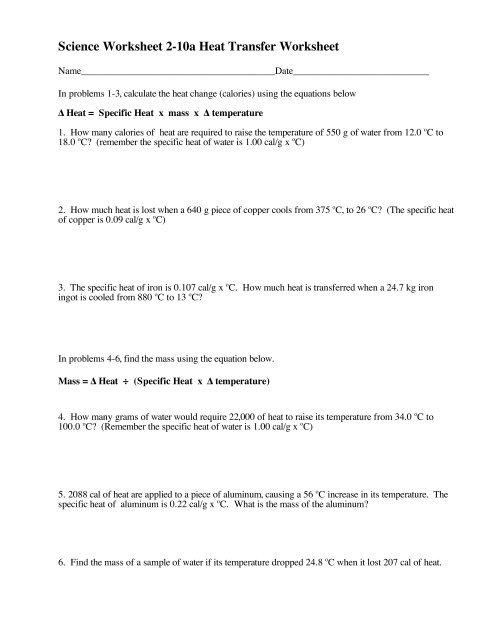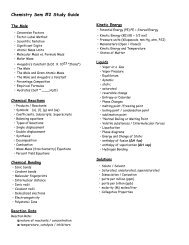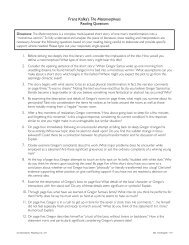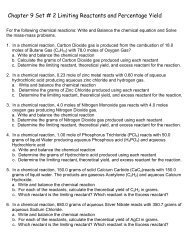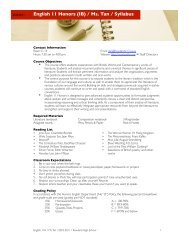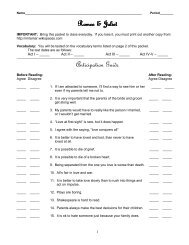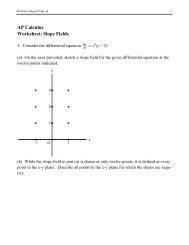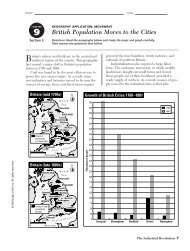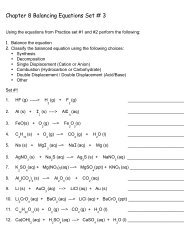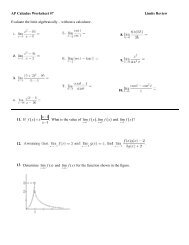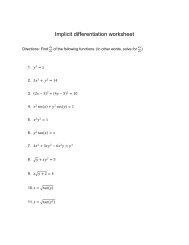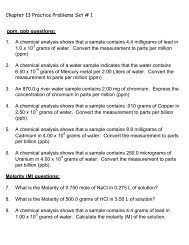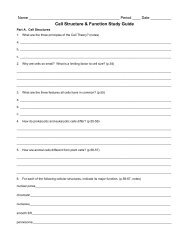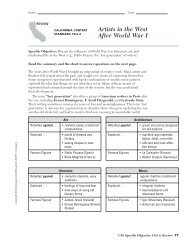You also want an ePaper? Increase the reach of your titles
YUMPU automatically turns print PDFs into web optimized ePapers that Google loves.
Science Worksheet 2-10a Heat Transfer Worksheet<br />
Name________________________________________Date____________________________<br />
In problems 1-3, calculate the <strong>heat</strong> change (calories) using the equations below<br />
∆ Heat = Specific Heat x mass x ∆ temperature<br />
1. How many calories of <strong>heat</strong> are required to raise the temperature of 550 g of water from 12.0 o C to<br />
18.0 o C? (remember the <strong>specific</strong> <strong>heat</strong> of water is 1.00 cal/g x o C)<br />
2. How much <strong>heat</strong> is lost when a 640 g piece of copper cools from 375 o C, to 26 o C? (The <strong>specific</strong> <strong>heat</strong><br />
of copper is 0.09 cal/g x o C)<br />
3. The <strong>specific</strong> <strong>heat</strong> of iron is 0.107 cal/g x o C. How much <strong>heat</strong> is transferred when a 24.7 kg iron<br />
ingot is cooled from 880 o C to 13 o C?<br />
In problems 4-6, find the mass using the equation below.<br />
Mass = ∆ Heat ÷ (Specific Heat x ∆ temperature)<br />
4. How many grams of water would require 22,000 of <strong>heat</strong> to raise its temperature from 34.0 o C to<br />
100.0 o C? (Remember the <strong>specific</strong> <strong>heat</strong> of water is 1.00 cal/g x o C)<br />
5. 2088 cal of <strong>heat</strong> are applied to a piece of aluminum, causing a 56 o C increase in its temperature. The<br />
<strong>specific</strong> <strong>heat</strong> of aluminum is 0.22 cal/g x o C. What is the mass of the aluminum?<br />
6. Find the mass of a sample of water if its temperature dropped 24.8 o C when it lost 207 cal of <strong>heat</strong>.
In problems 7-9 find the temparature change, using the equation below.<br />
∆ temperature = ∆ Heat ÷ (Specific Heat x mass)<br />
7. How many degrees would the temperature of a 450 g ingot of iron increase if 1818 cal of energy are<br />
applied to it? (The <strong>specific</strong> <strong>heat</strong> of iron is 0.107 cal/g x o C)<br />
8. A 250 g sample of water with an initial temperature of 98.8 o C loses 1794 cal of <strong>heat</strong>. What is the<br />
final temperature of the water? (Remember, final temp = initial temp - change in temp)<br />
9. Copper has a <strong>specific</strong> <strong>heat</strong> of 0.09 cal/g x o C. How much change in temperature would the addition<br />
of 8373 cal of <strong>heat</strong> have on a 538.0 gram sample of copper?<br />
In problems 10-12 find the Specifice Heat using the equation below.<br />
Specific Heat = ∆ Heat ÷ (mass x ∆ temperature)<br />
10. Determine the <strong>specific</strong> <strong>heat</strong> of a certain metal if a 450 gram sample of it loses 8253 cal of <strong>heat</strong> as its<br />
temperature drops by 97 o C.<br />
11. 1145 cal of <strong>heat</strong> are transferred to a 89.0 gram sample of an unknown material, with an initial<br />
temperature of 23.0 o C. What is the <strong>specific</strong> <strong>heat</strong> of the material if the final temperature is 89.5 o C?<br />
12. The temperature of a 55 gram sample of a certain metal drops by 113 o C as it loses 837 cal of <strong>heat</strong>.<br />
What is the <strong>specific</strong> <strong>heat</strong> of the metal?


